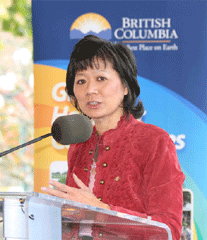
[Editor's note: Following publication Monday of Crawford Kilian's piece "How Good Is the BC Pandemic Plan?" The Tyee was contacted by the office of Minister of Healthy Living and Sport Ida Chong, requesting an opportunity to respond. We agreed and were pointed to this "opinion-editorial" Chong posted today to her ministry's web site, and given permission to run it here.]
B.C. has the responsibility to prepare for a variety of pandemic scenarios and the parameters established nationally and internationally have proven to be more than adequate to deal with what we have seen so far with the pandemic H1N1 flu virus.
Having a comprehensive and overarching pandemic plan already in place has certainly not slowed our response to the HIN1 virus -- quite the opposite, in fact.
Once the H1N1 situation became known this spring, as per our plan, B.C. increased surveillance activities, increased communications with health professionals and the public and linked with public health colleagues on a provincial and federal level to ensure a consistent approach to managing the outbreak across Canada. B.C. also presently co-chairs the national Special Advisory Committee on Pandemic H1N1 that provides advice and guidance to Canada's senior health officials.
In addition to all of the preparations laid out in B.C.'s pandemic plan, our public health officials have been anticipating and planning for the expected resurgence in H1N1 cases this fall and winter. They have had the opportunity to examine data from the southern hemisphere as those countries cope with the pandemic virus during their regular flu season. This has allowed public health officials to study the pandemic in real time, from its beginning, and use this data to inform our preparations here in B.C.
Government is prepared and our health-care system is prepared. B.C. has a stockpile of antiviral medications and other supplies such as masks, gowns and gloves sufficient to meet the needs of all British Columbians. We are in the process of modelling health-care impacts seen in the southern hemisphere and addressing any foreseeable gaps in our own preparedness and capacity.
We are also working to ensure those at high risk are prepared and educated about how to protect themselves from the H1N1 flu virus. The province is already acting upon our comprehensive H1N1 B.C. First Nations Action Plan that was developed in co-operation with First Nations stakeholders.
As part of these preparations, prior to the arrival of the pandemic H1N1 vaccine, we have been encouraging people with chronic underlying health conditions and pregnant women to talk to their doctor about getting a prescription for antiviral drugs in advance. This way, should they become ill with flu-like symptoms, they can phone their doctor and get the prescription filled without having to visit a clinic and risk getting other people sick. B.C.'s pandemic antiviral stockpile is sufficient to treat one million people. We anticipate this will be more than adequate to cope with any cases that arise due to the H1N1 or seasonal flu viruses.
Once the vaccine arrives in the province, B.C. has thousands of trained professionals capable of giving flu shots. As we announced last Monday, B.C.'s flu vaccine campaign this year will focus first on giving seasonal flu vaccines to those at highest risk for seasonal flu, and be followed closely by the H1N1 flu vaccine.
On Oct. 13, the seasonal flu vaccine will be offered to people 65 and older, and residents in long-term care homes. Starting in November, the H1N1 flu vaccine will be rolled out and will be available to everyone who needs and wants it. Then, in early 2010, the seasonal flu vaccine will once again be offered to everyone else under the age of 65 according to the usual guidelines.
The province and the Office of the Provincial Health Officer have been communicating with B.C.'s physicians on a regular basis through the B.C. Medical Association (BCMA) and the College of Physicians and Surgeons of B.C., including through the establishment of a web resource supported by all parties. In anticipation of a resurgence of the H1N1 virus, the province and the BCMA have also agreed that B.C. doctors will receive additional compensation to provide increased access to care for patients.
B.C. has also created a pandemic response framework and guidelines for pandemic planning to help school districts prepare. In fact, schools throughout B.C. have already distributed information to students and parents about the H1N1 flu virus, how to stay healthy and what to do if children get sick.
In general, public health officials in B.C. do not expect to close schools due to H1N1, as it hasn't been shown to be a useful or effective method in controlling the spread and impact of the virus. If there are unusual circumstances that call for a school to be closed (such as a large number of teachers being sick at the same time), that decision would be made by the local medical health officer in consultation with both the provincial health officer and the local school district. We do recommend all municipal governments, school boards and Crown corporations develop and implement individual pandemic plans, and we encourage these organizations to ask us for help if needed.
Simply put, B.C. is ready for the H1N1 virus.
We encourage British Columbians to remain calm, stay informed and, most importantly, wash their hands frequently and stay home if they're feeling sick. For all this information and more, visit www.gov.bc.ca/h1n1. ![]()














Tyee Commenting Guidelines
Comments that violate guidelines risk being deleted, and violations may result in a temporary or permanent user ban. Maintain the spirit of good conversation to stay in the discussion.
*Please note The Tyee is not a forum for spreading misinformation about COVID-19, denying its existence or minimizing its risk to public health.
Do:
Do not: